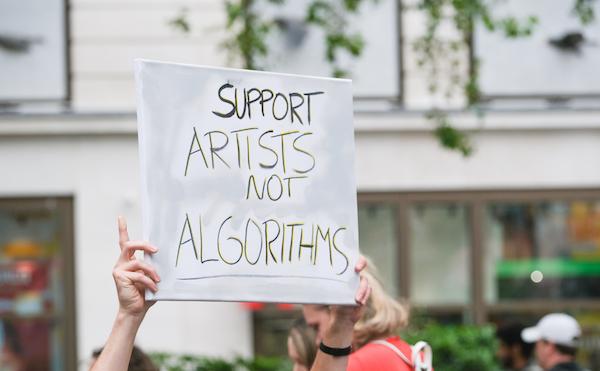The Implications of Artificial Intelligence in the Future of Content Creation
In a rapidly evolving world where technology continues to transform various industries, the Writers Guild of America strike shined a spotlight on the use of artificial intelligence (AI) in screenplay writing. As a content writer deeply passionate about the ethical implications of AI, I want to explore the relationship between AI-generated content and copyright law to shed light on the future landscape of content creation. Let's delve into the challenges and opportunities AI presents for the creative industry.
The Definition of Authorship in Copyright Law
Exploring the foundational requirements for copyright protection and how they pertain to emerging technologies like AI.
Under the United States Constitution and the Copyright Act of 1976, copyright protection is extended to original works of authorship. These works must possess a modicum of creativity and be fixed in a tangible medium of expression. However, the question arises – can AI-generated content be considered the product of human authorship? In landmark cases such as Burrow-Giles Lithographic Co. v. Sarony, the Supreme Court recognized that human involvement in the creative process is essential for copyright protection.
However, recent developments have challenged this notion. In the case of Naruto v. Slater, the Ninth Circuit Court of Appeals rejected the argument that animals, in this case a monkey, could be considered authors under the Copyright Act. The court stressed that human authorship is implied in the Act's language, thus excluding non-human entities.
The evolving stance of the United States Copyright Office reflects the need for clarity in the AI era. The Office now requires the disclosure of AI-generated content as part of the registration process. Only works that demonstrate human authorship by utilizing AI as an assisting instrument are eligible for copyright protection.
The Role of AI in Hollywood Writing
Examining the tensions between AI-generated scripts and traditional screenwriting practices in the film and television industry.
The Writers Guild of America strike underscores the concerns among industry professionals regarding AI's impact on traditional screenwriting. One key issue identified during negotiations between the WGA and producers was the fear that studios would use AI to generate scripts, which talented writers would then be tasked with modifying. This approach not only diminishes writers' creative input but raises questions about ownership and monetary compensation.
The tentative agreement reached between the WGA and the Alliance of Motion Picture and Television Producers (AMPTP) provides safeguards against yotiveive-generated content replacing the original creative work of writers. AI-generated scripts cannot be considered 'source material,' and they cannot serve as a starting point for writers to revise. This ensures that writers maintain their intellectual property rights and that AI is used as a supportive tool rather than a replacement for human creativity.
The Legal Precedents surrounding AI and Copyright Ownership
Analyzing influential court cases that have set the precedent for copyright ownership of AI-generated content.
In the case of Thaler v. Perlmutter, the United States District Court for the District of Columbia ruled that content generated solely by AI is ineligible for copyright protection. The court emphasized the long-established principle that authorship is contingent on human creativity and involvement. By referring to the previous ruling in Burrow-Giles Lithographic Co. v. Sarony, the court reinforced the importance of human conception and design in granting copyright protection to creative works.
This legal precedent highlights the significant role of human authorship and further solidifies the notion that AI-based systems, while capable of generating content, do not possess the creativity necessary for copyright protection.
The Future of AI in Content Creation
Exploring the potential implications and advancements of AI in the creative industries.
The growing presence of AI in the creative industries comes with undeniable challenges and opportunities. While AI is already capable of scoring top percentiles on reading exams and producing stories and poems, it is crucial to assess its impact on the livelihoods of professional writers. The adoption of AI technology in Hollywood writing and beyond raises important ethical and legal considerations worthy of ongoing discussion.
Major industry players like Netflix and Disney are actively investing in AI initiatives, highlighting the need for a delicate balance between creative innovation and preserving the value of human-authored content. This rapidly evolving landscape requires clear guidelines and agreements to protect the contributions of human writers while harnessing the potential of AI to enhance and assist the creative process.
Conclusion
The use of artificial intelligence in content creation, specifically in Hollywood and the creative industries, presents both challenges and opportunities for writers and creators. As with any emerging technology, striking a balance between harnessing AI's capabilities while maintaining the creative contributions and rights of human authors is crucial.
The legal precedents established thus far highlight the importance of human authorship and conception in copyright ownership. AI-generated content, lacking human involvement, remains ineligible for copyright protection. It is essential to continue the dialogue and regulation surrounding AI in the creative process to ensure ethical and legal considerations are upheld.
The future of content creation undoubtedly includes AI, and industry players must navigate this terrain with mindfulness, transparency, and fairness. By establishing clear guidelines and agreements, recognizing and protecting the creative contributions of human writers, we can harness the potential of AI to enhance and support the creative process without undermining the value of human creativity.

